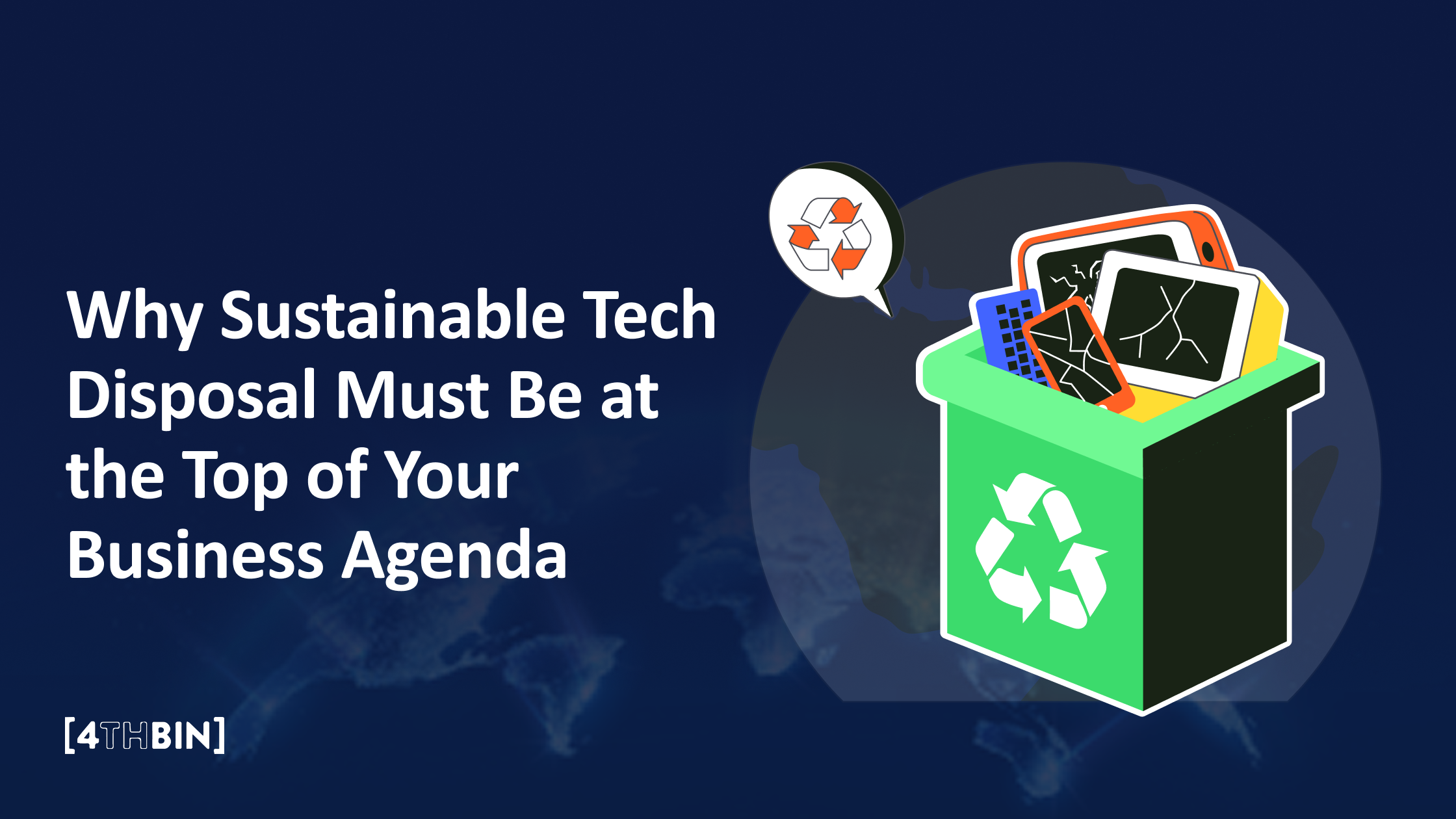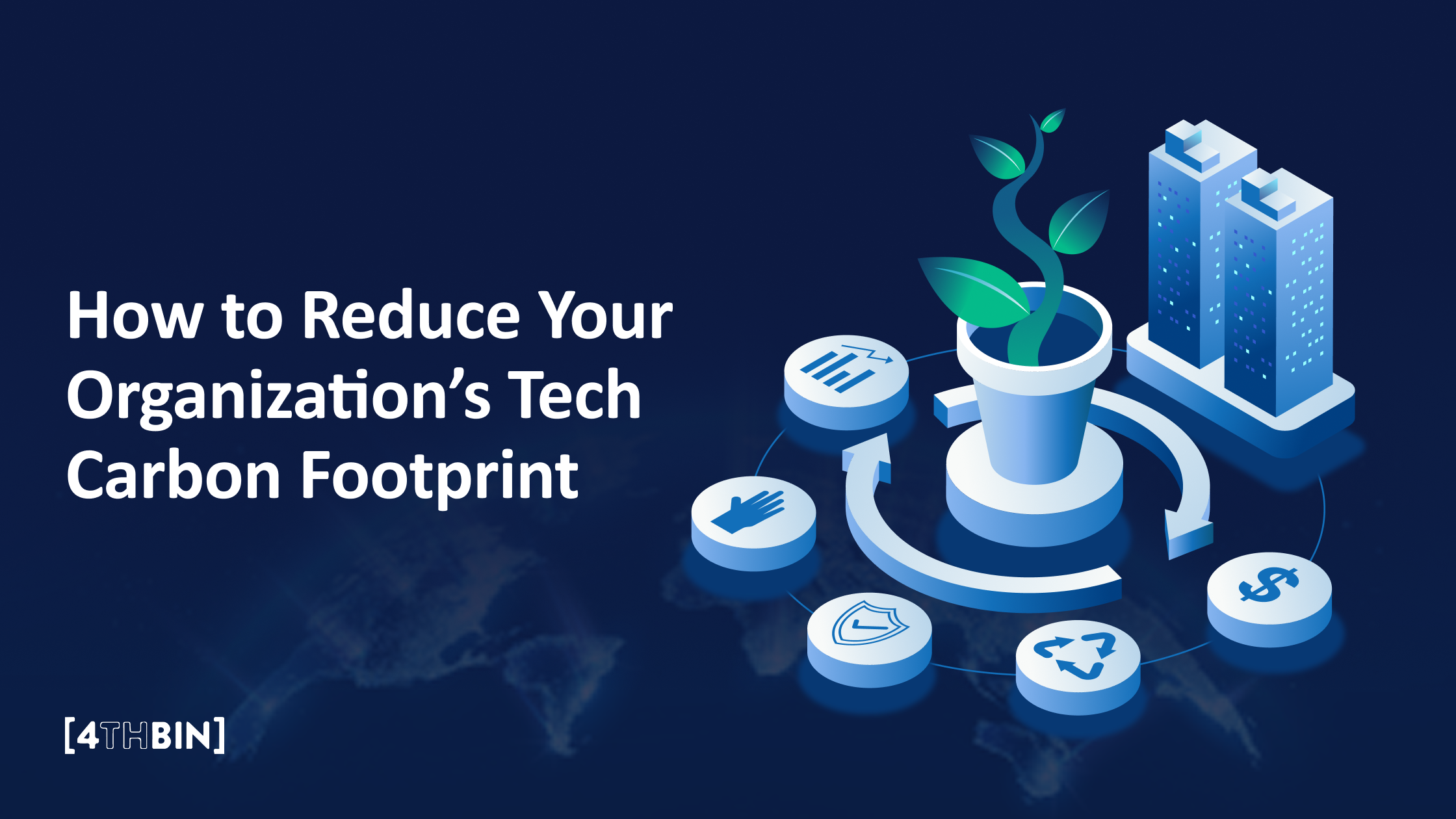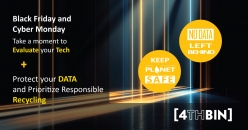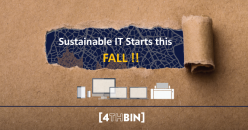Universal Waste: What Is It and How Can Businesses Manage It?
Most businesses use various products to help keep operations running smoothly—these could be batteries for equipment and electronics that drive communication and data processing.
However, many of these everyday items contain hazardous materials that are discarded once they’re no longer needed. The potential risks of mishandling these items are significant. Surprisingly, many businesses are unaware that they’re handling hazardous waste in their daily operations, let alone how to manage it properly.
Over 350 million tons of hazardous waste were generated in 2023 alone. With such alarming figures, managing universal waste becomes more than just a concern. It’s an environmental responsibility that every business must understand.
In this blog, we’ll explore universal waste, its types, and why businesses must manage it correctly.
What Is Universal Waste?
According to the US Environmental Protection Agency (EPA), universal waste refers to disposable items that contain hazardous substances widely produced by individuals or organizations. They may include everyday items such as batteries, fluorescent lamps, televisions, electronic devices, and items containing mercury, like a mercury thermometer.
As per the EPA’s Universal Waste Law, these items have separate regulations to streamline their collection, recycling, and disposal to prevent them from entering the general waste stream and causing environmental harm.
What Is Considered as Universal Waste?

As per the EPA, materials and items that pose significant environmental and health risks fall under universal waste. Here are the various types of universal waste and the hazards they pose:
Batteries
Due to their toxic components, lead-acid automotive batteries, nickel-cadmium rechargeable batteries, and mercury-containing batteries are classified as universal waste. These batteries contain heavy metals like lead, cadmium, and mercury, which can leach into soil and water, posing serious health risks such as kidney damage and neurological disorders.
Pesticides
Certain pesticides become classified as universal waste when recalled, banned, or accumulated as no longer usable stockpiles. These substances can be highly toxic to humans and wildlife, contaminating land, air, and water. Improper disposal of pesticides can lead to bioaccumulation in the food chain, leading to ecological and health problems.
Mercury-Containing Equipment
Items such as thermostats, thermometers, barometers, and electrical switches fall under this category due to the presence of mercury, a potent neurotoxin. Mercury exposure can lead to serious health issues, including neurological damage and digestive and immune system dysfunction, particularly in young children and fetuses.
Lamps
This category includes fluorescent bulbs, high-intensity discharge lamps, and neon lights. These lamps contain mercury vapor, which can be released into the environment if broken. Mercury exposure can lead to poisoning and environmental contamination, affecting wildlife and human health.
Aerosol Cans
Aerosol cans, which can contain fuels and chemicals such as pesticides, solvents, or paints, are considered universal waste due to their hazardous contents and potential for explosion. Improper disposal can release volatile organic compounds (VOCs) and other pollutants into the air, contributing to air pollution and respiratory problems. However, it is essential to note that empty aerosol cans do not fall under the universal waste category.
Electronics
Electronic devices such as computers, televisions, and mobile phones are often categorized as universal waste because they contain hazardous substances like lead, cadmium, and brominated flame retardants. When released into the environment, these substances can be toxic, leading to pollution and health risks associated with exposure to heavy metals.
Properly managing these types of universal waste can mitigate the environmental impact and protect public health from the dangers posed by their hazardous components.
Understanding EPA Regulations with Universal Waste Management
The Environmental Protection Agency (EPA) has established specific regulations for businesses to manage their universal waste. The goal of these EPA regulations is trifold; it aims to:
- Promote the collection and recycling of universal waste
- Ease the burden on businesses who wish to collect and recycle these wastes and on transporters of these wastes
- Encourage the development of municipal and commercial programs to prevent the waste from being dumped into solid waste landfills or combustors.
Here’s an overview of these regulations that businesses must follow when collecting, recycling, and disposing of universal waste:
Accumulation Time
As per the EPA, businesses can accumulate universal waste for up to one year. This time frame allows sufficient time for the waste to be properly collected and prepared for recycling or proper disposal. This requirement helps businesses collect adequate waste to facilitate economical and appropriate recycling or treatment.
Labeling and Marking
Containers holding universal waste must be clearly labeled to identify the contents and the waste category. Each container, or the universal waste itself if not contained, should be marked with the words “Universal Waste” followed by a descriptor of the type of waste, such as “Universal Waste - Batteries,” “Universal Waste - Lamps,” or “Universal Waste - Mercury Devices.”
This labeling is essential to ensure that universal waste services, transporters, and facility workers immediately recognize the waste as universal waste, facilitating proper management and compliance throughout its collection, storage, and disposal process.
Transportation
Universal wastes can be self-transported by the waste’s handler or transported by a third party.
Unlike regular hazardous waste, universal waste does not require a hazardous waste manifest for transportation. However, the person transporting the waste must still comply with Department of Transportation (DOT) regulations, ensuring the safe and secure movement of the waste to prevent leaks, spills, or accidents during transit.
Destination Facilities
Businesses must deliver universal waste to an authorized recycling or disposal facility under
Resource Conservation and Recovery Act (RCRA) to treat, dispose of, or recycle a particular category of universal waste. These facilities are regulated under state and federal laws to ensure they can manage the waste without harming the environment or public health.
State-Specific Regulations
While the EPA provides a federal framework, individual states can implement their universal waste regulations, which can be more stringent than federal requirements. Many states have added additional categories of universal waste to their programs, such as aerosol cans, electronics, and photographic waste.
For example, in Ohio and Texas, paint and paint-related waste are considered universal waste. Solar panels and photovoltaic modules also fall under this category in other states like California and Hawaii. In Pennsylvania, photographic solutions are also regarded as universal waste. Hence, it becomes imperative for businesses to be aware of both federal and state regulations to ensure compliance.
By adhering to these rules, businesses can help protect the environment and public health from the risks associated with hazardous waste.
How Can Your Business Manage Its Universal Waste?
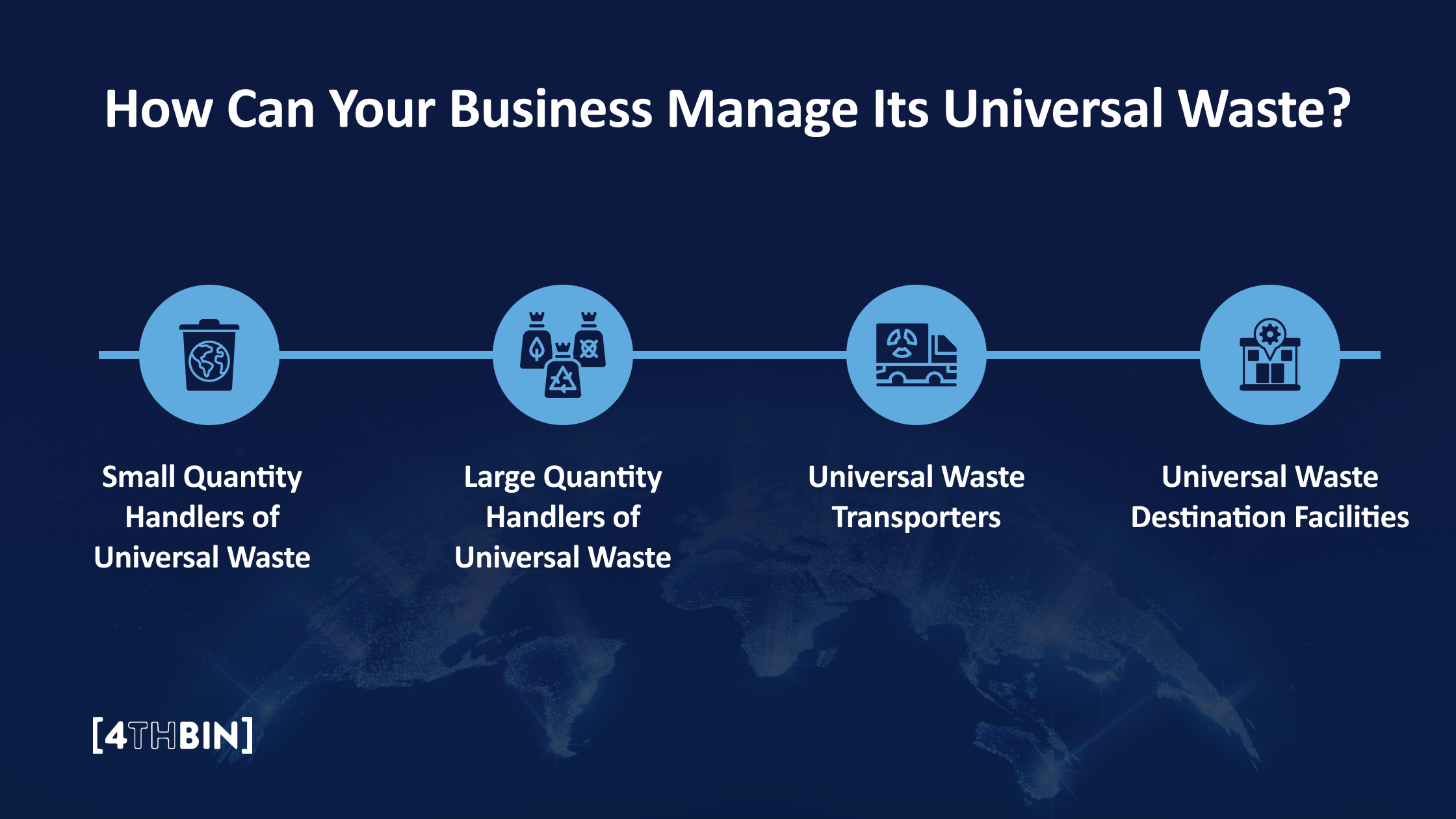
Proper management of universal waste is crucial for businesses to ensure compliance with environmental regulations and protect public health and the environment. The EPA defines the roles and responsibilities of different types of regulated participants in the universal waste system. Understanding these roles and responsibilities is critical to effective waste management. Here’s how businesses can navigate these regulations based on their role:
Small Quantity Handlers of Universal Waste
Small businesses that accumulate less than 5,000 kg of universal waste are called small-quantity handlers of universal waste. As a small quantity handler, monitoring the quantity of waste collected is vital to ensure it does not exceed this threshold.
Businesses must ensure that all universal waste is stored in structurally sound containers that are securely closed to prevent breakage. Moreover, these containers must be labeled with the type of universal waste stored. As per the EPA, businesses must train their employees on proper handling practices and emergency procedures specific to the types of universal waste their business manages.
Large Quantity Handlers of Universal Waste
Large businesses that accumulate 5,000 kg or more of universal waste are called large-quantity handlers of universal waste.
Inventory Management: These businesses must regularly track and document the amount of universal waste stored on-site to ensure compliance with the 5,000 kg threshold, differentiating large from small quantity handlers.
Detailed Reporting: They must maintain records of all universal waste received and shipped and store these records for at least three years. Documentation should include dates, quantities, and types of waste.
Safety and Compliance Audits: They must conduct regular audits to ensure that handling, storage, and transportation practices meet all state and federal regulations.
Universal Waste Transporters
Universal waste transporters must ensure their business has acquired proper licenses and insurance to transport universal waste. They must also understand and comply with state and federal transportation regulations.
When transporting waste, they must use appropriate containers and vehicles to prevent leaks and spills and ensure all universal waste is labeled and safely secured in transit. These businesses must transport the waste only to certified universal waste destination facilities certified by the RCRA and maintain detailed logs of all transport activities.
Universal Waste Destination Facilities
Universal waste destination facilities must obtain and maintain certification to operate as a universal waste destination facility. This often involves rigorous inspections and compliance with stringent environmental standards.
These facilities must also implement waste processing, treatment, and disposal techniques to manage and mitigate the risks associated with hazardous components of universal waste. They must also regularly report to environmental agencies on the quantities and types of waste processed, emphasizing transparency and adherence to regulatory requirements.
By identifying your business’s role in the universal waste management chain, you can implement the appropriate strategies and processes to ensure compliance and minimize environmental impact.
Manage Your Universal Waste Effectively with 4THBIN!
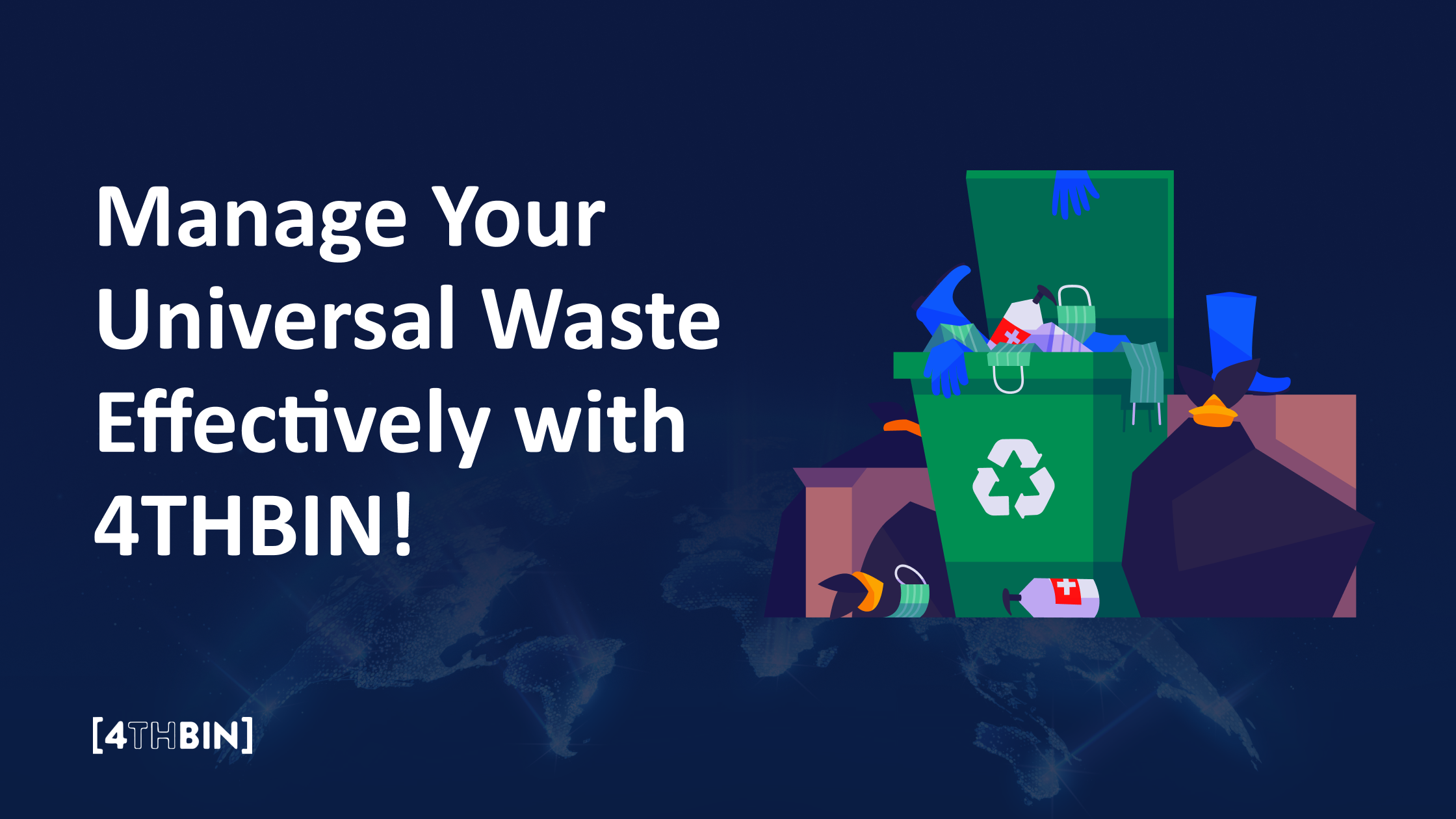
Is your organization struggling to recycle its electronic waste? 4THBIN to the rescue! With over a decade of experience, 4THBIN is a certified and secure e-recycling solution provider to over 10,000 businesses – from Fortune 100 companies to start-ups across the United States.
We believe that no data should be left behind! Backed by our data security expertise, we provide certified data destruction support to today’s top industries.
We are expanding our services to offer comprehensive universal waste services. From batteries and fluorescent lamps to other hazardous materials, we coordinate the safe collection, recycling, and disposal of universal waste, making it easier for your business to stay compliant with environmental regulations. We also help your business deliver on its corporate social responsibility commitments by ensuring its e-waste is securely and sustainably recycled.
Ensure Responsible Universal Waste Disposal Today!
Contact Us


